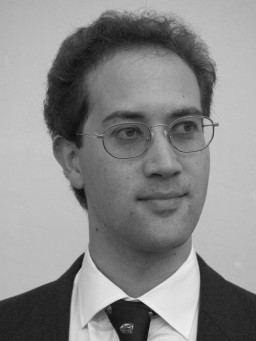Moving into the future with real-time and predictive traffic management
- 1/29/20 1:49 PM
- Kirsten Oswald
How geospatial data and a digital map of the world can help transform mobility

HERE Technologies, named number one location platform this year by Strategy Analytics, focusses on stepping beyond maps to building a digital representation of reality. This can be helpful in a number of ways like for real-time and predictive traffic management, which can contribute to making the mobility system more energy efficient. In an interview, David Jonietz, former PostDoc scientist in the SCCER Mobility network, shares his experience in switching from academia to being a research group leader at HERE Technologies. Along with David Kreil, one of the founding directors, he also talks about the newly established Institute of Advanced Research in Artificial Intelligence (IARAI).
HERE Technologies is a location data and technology platform and apart from map data, they offer a broad portfolio of solutions related to location and spatial intelligence. This includes products ranging from map content to positioning and traffic as well as various other location services. Their vehicle fleet equipped with sensors generates most of the data in real-time. In this sense, HERE Technologies strives to create a digital image of reality that is dynamic and always up-to-date. This is especially valuable for applications related to traffic planning, routing or intelligent transportation systems as well as creating use cases for autonomous vehicles. Moreover, this attracts a variety of costumers from many different areas like the automotive sector, logistics, insurance companies, IoT and even government agencies.
At HERE Technologies, David Jonietz leads a team of data scientists that develops methods for analyzing traffic flows. His background is in geoinformatics with an expertise in machine learning techniques and deep neural networks, which are learning algorithms inspired by the functionality of the human brain. This is exactly what his group specializes in. One of the softer challenges in his day-to-day work is dealing with diverse backgrounds in his globally distributed team and defining a common language that everyone can follow. However, this is also extremely enriching because everyone brings his or her own unique approaches and perspectives to the team. Furthermore, David Jonietz says the majority of his everyday work is still very much hands-on, so he still feels very in touch with engineering sciences.
Previously he led the Mobility Information Engineering Lab (MIE Lab) belonging to the Chair of Geoinformation Engineering at ETH Zurich. During this time, the team consisted of three PhD students who also worked on the SCCER Mobility projects GoEco! and SBB Green Class. This work was helpful in gaining a broad view of the mobility system and transition and dive deep into the topics of digitalization and its potential impacts on mobility and traffic. Many experiences from ETH Zurich are also relevant for his position now, such as the design of machine learning methods for handling large GPS data sets or the development of a strategic direction for a research lab. However, he does emphasize that supervising a team of academic researchers is quite different from leading a team of scientists in the private sector, as the goals and motivation are quite divergent.
David Jonietz points out a few more differences between academia and industry. Academic work often finalizes with the proof of concept phase and a corresponding publication of some sort. Whereas, in the private sector, there is a strong expectation to eventually transform research results into marketable products, which often leads to somewhat stricter requirements. He also thinks that while academic work in general entails more freedom, its quality is still often measured merely in terms of the number of resulting publications. In the private sector, although the potential topics of interest are generally more restricted, there is less focus on publishing the results. However, the technical challenges can be very similar, while scalability is in many cases relevant for industry; data availability affects the academic world more heavily.
When asked how his work at HERE Technologies promotes the mobility transition, David Jonietz stresses that digital technologies may be a game changer. Services offered by location intelligence providers have the potential to optimize the transport system, especially if insights are provided in real-time. Smart planning and efficient management of the transport system could help reduce energy consumption of the sector. For example, HERE Technologies is currently involved in a collaborative research project with ETH Zurich and ESRI to develop a decision support system for ride sharing (project of the MIE Lab), which could increase occupancy rates and thus improve efficiency.
In addition to such collaborations, HERE Technologies is also a key partner in the recently established Institute of Advanced Research in Artificial Intelligence (IARAI). Its goal is to advance basic and applied research in artificial intelligence. It aims to build a unique environment for excellent researchers, where industrial scale real-world data is openly shared with the scientific community. A key focus is on advancing state of the art map and location-based models. As partner, HERE Technologies provides unique map and traffic-related data, shares its domain specific knowhow and advises on high impact application domains, along with guaranteeing the resources to run the independent research institute for the first five years. IARAI actively collaborates and is open for further collaborations with regional and city governments, leading universities like ETH Zurich as well as other research institutes with shared interests in advanced research in artificial intelligence or map / location-based models. In fact, the institute currently has openings for research fellows at all levels.
The institute promotes open academic research and exchange with data analysis competitions. In this context, David Kreil played a major role in helping formulate and set up a community-wide traffic forecasting competition, combining key data from HERE Technologies as well as skills and resources of the institute. The Traffic4Cast competition aims at encouraging innovative traffic prediction that will help growing cities tackle their mobility and sustainability challenges. It is based on 100 billion probe points covering three entire cities. Participants are challenged to predict traffic flow volumes, heading and speed on whole city maps looking 15 minutes into the future. Ultimately, this could open up new ways to transitioning to sustainable and smart transportation systems, where artificial intelligence will play a major role. Last year, over 40 teams of international scientists contributed over 500 submissions to the competition. The best work was presented in the official Competition Track of NeurIPS, the largest conference on Artificial Intelligence, with over 13,000 delegates. A team from ETH Zurich actually won the silver trophy award last time.
Both HERE Technologies and IARAI contribute to the energy and mobility transition by establishing and promoting methods that can help make mobility more energy efficient. When asked what else needs to be done to meet global climate goals, David Jonietz underlines the global aspect of the issue and that a mix of bottom-up and top-down approaches is necessary. Even though people’s mindsets are changing and they are becoming more aware of the climatic implications of their lifestyles and companies are offering more and more sustainable solutions, there is a risk that this will not bring about substantial change fast enough. Therefore, he thinks a top-down impulse by politics on a global level will also be necessary if we want to lower greenhouse gas emissions quickly, which is urgent.

Dr. David Jonietz is a research group leader at HERE Technologies specialized in machine learning techniques for applications related to traffic and transportation. Previously he headed the Mobility Information Engineering (MIE) Lab at ETH Zurich and was a member of SCCER Mobility Capacity Area B1.

Dr. David Kreil is a leading data scientist with expertise in modelling high dimensional spaces and a founding director of the Institute of Advanced Research in Artificial Intelligence (IARAI). He is also a professor at Boku University Vienna, has held positions at the University of Warwick and worked in Cambridge at the European Bioinformatics Institute.
!!! This document is stored in the ETH Web archive and is no longer maintained !!!